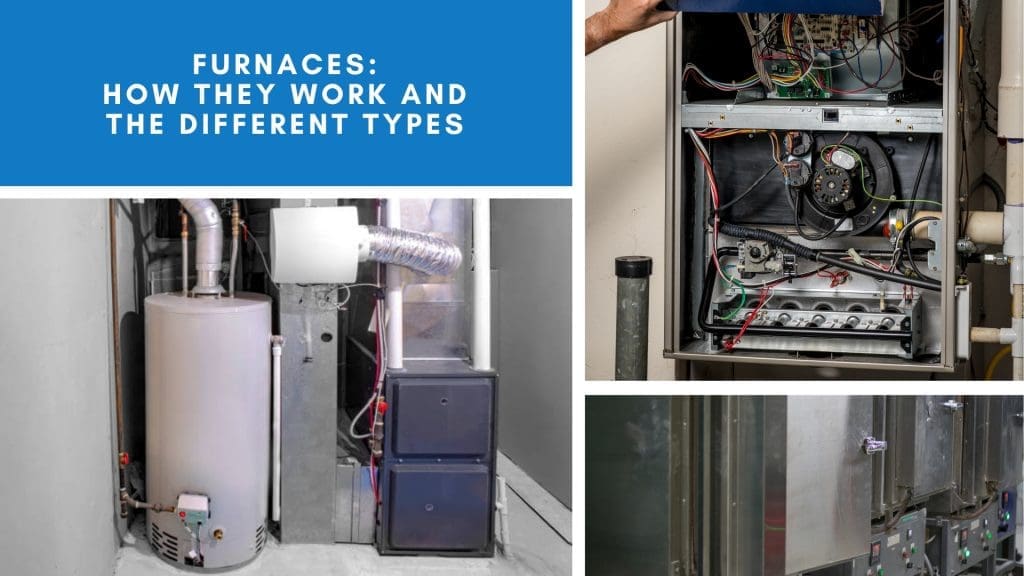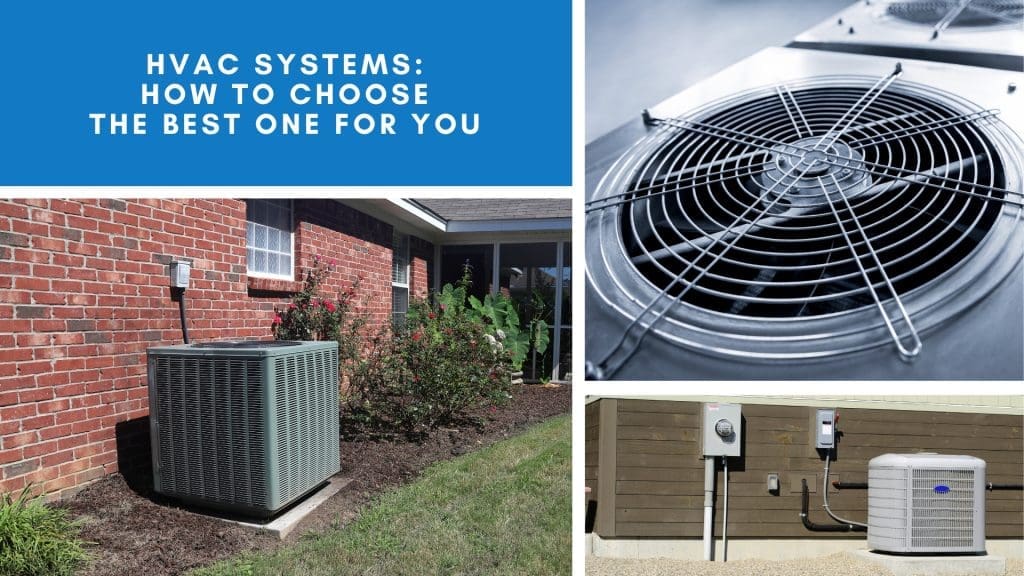TL;DR Summary for Those in a Hurry:
- HEPA or Activated Carbon filters have different strengths — HEPA excels at capturing tiny particles (like pollen and dust), while activated carbon targets odors and gases.
- Choosing the right filter depends on your primary air quality goal (allergen reduction vs. odor/chemical control).
- HEPA filters are ideal for allergy or asthma sufferers because they trap very fine particles.
- Activated carbon filters are best when eliminating smells from pets, cooking, or smoke.
- Some systems combine both for balanced performance, improving overall indoor air quality more effectively.
Showdown: HEPA or Activated Carbon?
In today’s world, clean air is more important than ever. With pollution levels rising, many people are turning to air purifiers. But with so many options, how do you choose the right filter?
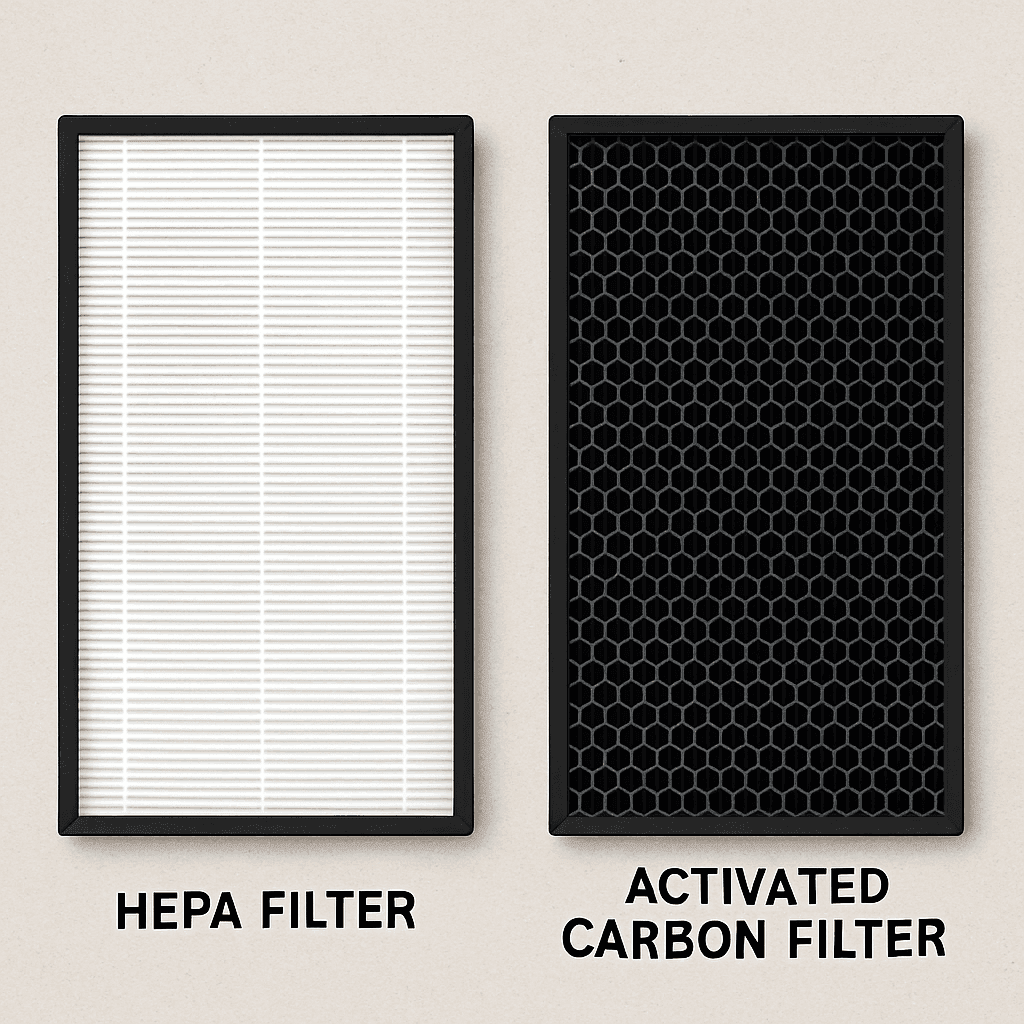
Two popular choices are HEPA and Activated Carbon filters. Each has its strengths and weaknesses. Understanding these can help you make an informed decision.
HEPA filters are known for their ability to capture tiny particles. They are great for removing dust, pollen, and pet dander. This makes them a favorite for allergy sufferers.
Activated Carbon filters, on the other hand, excel at removing odors and gases. They are perfect for homes with smokers or strong cooking smells. They can also tackle volatile organic compounds (VOCs).
Choosing between these filters depends on your specific needs. Some air purifiers even combine both for comprehensive air cleaning. This combination can offer the best of both worlds.
In this article, we’ll dive deep into the differences between HEPA and Activated Carbon filters. We’ll explore their pros and cons, helping you decide which is right for you. Whether you’re a stay-at-home mom, a small business owner, or working from home, this guide is for you.
Understanding Air Purification: Why Filters Matter
Air purification is essential for maintaining a healthy environment in your home or office. Clean air helps reduce allergies, asthma, and respiratory issues, providing a better quality of life.
Filters play a crucial role in this process. They capture and remove pollutants, improving the air you breathe. Without effective filters, air purifiers cannot perform at their best, leaving harmful particles in the air.
Different filters target various pollutants. Choosing the right one depends on your specific needs. For example, HEPA filters excel at particle removal, while Activated Carbon filters focus on odors and gases.
Here’s why filters matter in air purification:
- Capture dust, pollen, and mold spores
- Remove pet dander and other allergens
- Eliminate odors and harmful gases
When selecting an air purifier, it’s vital to understand which filters are needed for your particular setting. A well-functioning system can significantly enhance indoor air quality.
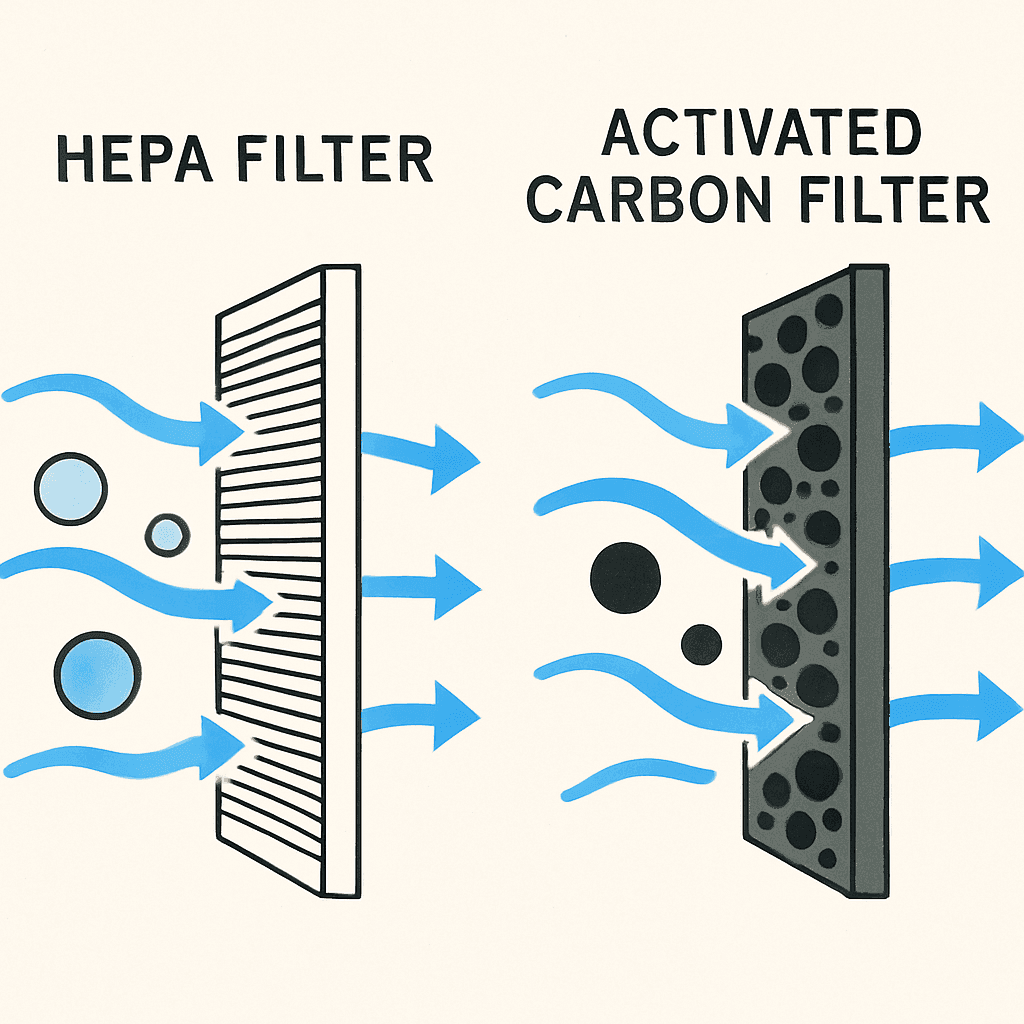
What is a HEPA Filter? How It Works and What It Removes
HEPA stands for High-Efficiency Particulate Air. These filters are renowned for their ability to capture tiny particles. They’re designed to trap 99.97% of particles as small as 0.3 microns.
The structure of a HEPA filter is like a dense mat of fibers. As air passes through, particles are trapped within this mesh, purifying the air. This makes them highly effective for removing common allergens.
HEPA filters are perfect for families with asthma or allergies. They remove dust mites, pollen, mold spores, and pet dander, offering relief from respiratory issues.
Using a HEPA filter in a purifier or HVAC system can significantly reduce airborne contaminants. They’re also used in settings requiring high air quality standards.
Some key points about HEPA filters include:
- Traps fine particles and allergens
- Used in hospitals and laboratories
- Needs regular replacement every 6-12 months
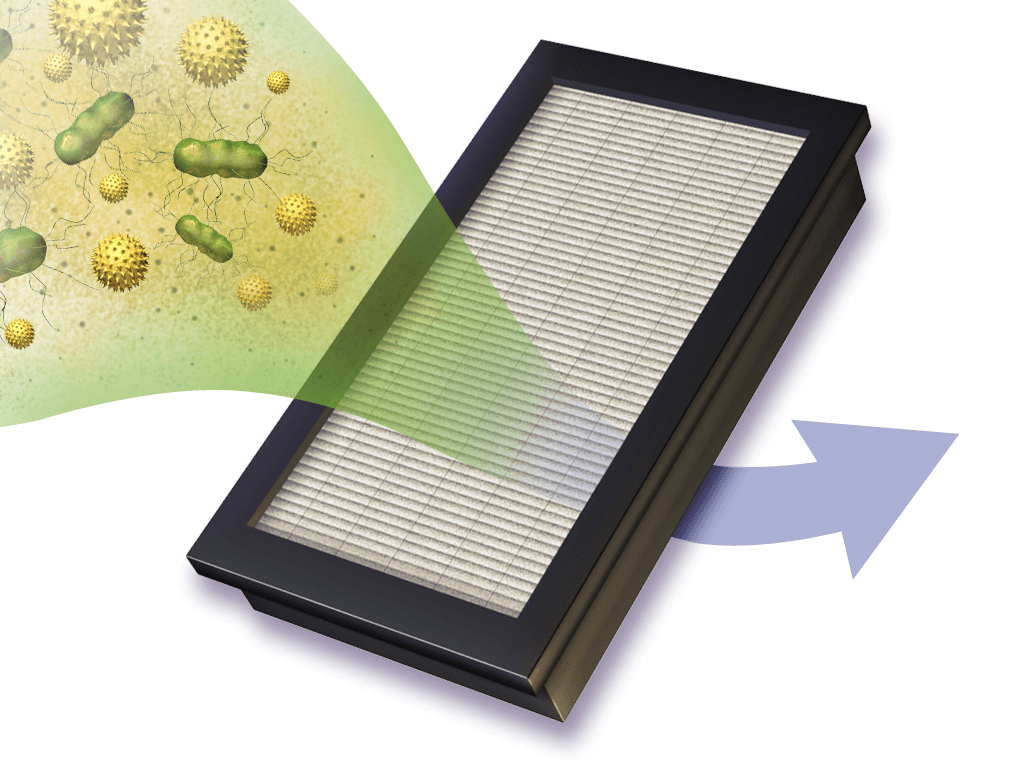
Regular maintenance and timely replacement of HEPA filters are essential for optimal performance. Clogged filters decrease air quality and can strain air purifiers.
If you have pets or live in a high-pollen area, a HEPA filter can be a game-changer. Experience cleaner air and breathe easier with a true HEPA filter.
What is an Activated Carbon Filter? How It Works and What It Removes
Activated carbon filters are valued for their unique ability to remove odors and gases from the air. Using a process called adsorption, they effectively capture pollutants on a molecular level.
These filters contain activated carbon, which is charcoal treated to be highly porous. This porosity provides a large surface area for pollutants to adhere to, trapping them effectively.
The strength of activated carbon filters lies in their ability to remove volatile organic compounds (VOCs). They are perfect for environments dealing with strong odors or chemical pollutants.
Households where cooking, smoking, or cleaning frequently occurs can benefit greatly. These filters efficiently neutralize unpleasant smells, creating a more pleasant indoor environment.
Key features of activated carbon filters include:
- Ability to remove odors and gases
- Effective against volatile organic compounds
- Needs more frequent replacements due to saturation
Depending on pollution levels, activated carbon filters might require frequent replacements. Unlike HEPA filters, they are sometimes refreshed by exposure to sunlight but replacing them is best for optimal performance.
When used in conjunction with HEPA filters, they provide a comprehensive air purification system. For those sensitive to chemicals or with strong odor concerns, activated carbon filters offer substantial relief.
HEPA vs. Activated Carbon: Key Differences at a Glance
When it comes to air filters, understanding the core differences helps make informed choices. HEPA and activated carbon filters serve distinct but complementary purposes.
HEPA filters are experts at trapping tiny particles. They capture dust, pollen, and pet dander with impressive efficiency. Their forte is particulate matter removal, making them ideal for allergy relief.
In contrast, activated carbon filters are adept at odor and gas elimination. They excel in removing volatile organic compounds and unpleasant smells from the air. This capability makes them invaluable in kitchens and smoking areas.
The two filters often work best together. With HEPA tackling particulates and activated carbon handling gases, they can offer comprehensive air purification.
Here’s a quick comparison:
HEPA Filters:
- Removes dust, pollen, and pet dander
- Not effective against gases or odors
Activated Carbon Filters:
- Removes odors and gases
- Not effective against particulates
Choosing the right filter depends on specific needs. For a balanced approach, using both types can optimize indoor air quality. They complement each other, offering a holistic solution for a cleaner, fresher home environment.
Pros and Cons: HEPA Filters
HEPA filters are renowned for their high efficiency in capturing particles. They’re beneficial for those with allergies or respiratory issues.
However, no filter is perfect. While HEPA filters excel in removing particulates, they do not address odors or gases. This limitation requires consideration when dealing with multi-source air quality issues.
Their capability to trap particles as small as 0.3 microns is a significant advantage. This precision is why they’re often found in medical and cleanroom environments.
On the flip side, HEPA filters need regular replacement. This can become a recurring cost, impacting long-term budget considerations.
Here’s a quick rundown of HEPA filter pros and cons:
Pros:
- Captures 99.97% of tiny particles
- Ideal for allergy sufferers and clean environments
- Found in many air cleaning devices
Cons:
- Ineffective against odors and gases
- Requires regular replacement, leading to ongoing costs
Pros and Cons: Activated Carbon Filters
Activated Carbon filters excel at removing odors, gases, and volatile organic compounds (VOCs) from the air. They are particularly useful in homes with smokers or strong cooking smells.
One downside is their lack of effectiveness in capturing particulate matter. This limitation means they aren’t suited as a standalone solution for general air purification.
The affordability of Activated Carbon filters is another strength. They are often less expensive than HEPA filters, making them a budget-friendly option.
However, these filters typically require more frequent replacement. The need for regular refreshment can add to long-term maintenance responsibilities.
Here’s a concise look at Activated Carbon filter pros and cons:
Pros:
- Effectively removes odors, gases, and VOCs
- Beneficial for chemical sensitivities
- Often affordable and accessible
Cons:
- Not effective for particulates like dust and pollen
- Needs frequent replacement, adding to ongoing costs
When to Choose HEPA, Activated Carbon, or Both
Selecting the right filter depends on your specific air quality needs. Consider the unique strengths of HEPA and Activated Carbon filters.
HEPA filters are your best choice if allergens, dust, and pet dander are your main concerns. They’re top-notch for reducing particulate matter.
On the other hand, if you struggle with odors, gases, or chemical sensitivities, Activated Carbon filters should be your go-to. They’re fantastic for tackling these issues.
Sometimes, it pays to combine both types of filters. This offers comprehensive coverage for both particles and gases, enhancing overall air purification.
Think about your living environment and air quality goals. It’s crucial to tailor your choice to these factors for the best results.
Here’s a quick guide to help you decide:
Choose HEPA if:
- Allergies and dust are problems
- You have pets at home
Choose Activated Carbon if:
- Odors or chemical sensitivities are issues
- You need to remove VOCs
Choose Both if:
- You want a comprehensive air cleaning solution
Real-World Applications: Which Filter for Which Problem?
Different environments call for different air purification strategies. Selecting between HEPA and Activated Carbon filters depends on your surroundings.
In homes with pets, HEPA filters are invaluable. They efficiently capture pet hair and dander, keeping the air cleaner and fresher for allergy sufferers.
For people who deal with strong cooking odors or smoke, Activated Carbon filters are a must-have. They actively absorb the unpleasant smells and gases, maintaining a neutral air quality.
In city apartments where pollutants from traffic can sneak indoors, pairing both filters is often the best solution. This combination fights against particulate matter and chemical pollutants effectively.
Business owners, especially those in hospitality or clinics, might require both types. Offering cleaner air for guests and patients can enhance comfort and health.
For office settings with diverse air quality challenges, a dual-filter system is ideal. It accommodates different needs, ensuring a pleasant work environment.
Here’s how to decide:
HEPA Filters:
- Homes with allergies
- Pet owners
- Clinics
Activated Carbon Filters:
- Kitchens
- Smokers
- Urban apartments
Both Filters:
- Office spaces
- Hotels
- Homes near busy roads
Maintenance, Replacement, and Cost: What to Expect
Understanding the upkeep of air filters is crucial. Both HEPA and Activated Carbon filters require attention to perform optimally.
HEPA filters generally need replacement every 6 to 12 months. This timeline can shift depending on usage and local air quality.
Activated Carbon filters often need more frequent changes, especially in environments heavy with odors or chemicals.
Budget considerations are essential. While HEPA filters can be pricier upfront, the benefits often justify the investment, especially for allergy sufferers.
To ensure maximum efficiency, regularly monitor and maintain your filters. Here’s a quick guide:
HEPA Filters:
- Replacement: Every 6-12 months
- Cost: Higher, but effective for allergies
- Maintenance: Regular inspection
Activated Carbon Filters:
- Replacement: More frequent
- Cost: Generally lower
- Maintenance: Check for odor saturation
Keeping tabs on filter life ensures healthier indoor air. Clean filters contribute to a more comfortable living or working space.
How to Buy the Right Filter: Tips for Homeowners and Small Businesses
Choosing the right air filter doesn’t have to be complicated. Start by assessing your specific air quality needs.
Consider the types of pollutants most common in your environment. For instance, smoke or pet dander may affect your choice.
Think about the size and layout of the space you need to purify. Larger spaces may require more robust filtration solutions.
It’s also smart to set a realistic budget. Factor in long-term costs like filter replacements and energy consumption.
When ready to purchase, look for trusted brands and customer reviews. Here’s a quick checklist to guide you:
- Assess air quality issues (e.g., allergens, odors)
- Determine the space size needing purification
- Set a budget, including maintenance costs
- Research reputable brands and read customer feedback
- Consider the long-term investment for health benefits
Making an informed choice will lead to better air and greater peace of mind.
Final Thoughts: Making the Best Choice for Your Air Quality — HEPA or Activated Carbon
Selecting the right air filter is vital for comfort and health. Consider your specific air quality concerns and budget.
Remember, combining HEPA and Activated Carbon filters often gives you comprehensive air purification. Evaluate your environment’s needs, and don’t hesitate to reach out for expert guidance. Investing in clean air improves your quality of life.
Need Help? Contact LC Heating and Air Conditioning Hollywood
Looking for reliable air purification solutions? LC Heating and Air Conditioning Hollywood is here to help. Our team is dedicated to providing top-notch services tailored to your needs.
Give us a call at (818) 858-7080 for expert advice and solutions. Our friendly team is ready to assist you every step of the way.
When deciding between HEPA or Activated Carbon, consider whether you need particle removal or odor/gas control — and select the filter type (or combination) that best matches your indoor air quality needs and health goals.
FAQ:
What’s the difference between HEPA or Activated Carbon filters?
HEPA filters capture tiny airborne particles like dust, pollen, and allergens, while activated carbon filters are designed to trap odors, gases, and volatile organic compounds (VOCs).
Which filter type is better for allergy sufferers?
HEPA filters are generally the best choice for people with allergies or asthma because they remove very fine particles that trigger respiratory symptoms.
Are activated carbon filters effective at removing smoke and odors?
Yes — activated carbon is especially effective at capturing odors from cooking, pets, smoke, and chemical fumes, making indoor air more pleasant to breathe.
Can I use both HEPA and activated carbon filters together?
Absolutely — many air purifiers and HVAC systems combine HEPA and activated carbon filters to provide both particle removal and odor/gas control for more complete air purification.
How often should HEPA or activated carbon filters be replaced?
Replacement frequency varies: HEPA filters often need changing every 6–12 months, while activated carbon filters may need replacement more frequently depending on odor load and usage.
Does choosing one filter type impact energy usage?
Using higher‑efficiency filters (especially high‑MERV HEPA filters) can slightly increase system resistance and energy use, so balance filtration needs with your HVAC or purifier’s airflow capacity.

